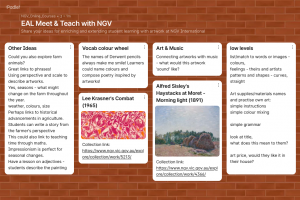NGV Resourcing Events
Summary
Two professional learning events for EAL teachers were held with a focus on works in the collection of the National Gallery of Victoria. These were on 8 and 15 September and took place online. Leah Santilli, Outreach Educator for the NGV, with assistance from her colleagues, Anna Zobel and Lily Feiner (8 September) and Tess Rangelov and Amy Duncan (15 September) showed us some wonderful works and discussed ways that they might be the focus of some engaging lessons with EAL learners, both school aged learners and also adults.
In the first session we saw some amazing shields from the NGV collection that were from various Australian Indigenous peoples. We discussed their creation and usage and looked closely at the patterns, colours and shapes of them, as well as at how they were displayed together in the Gallery. We took part in an activity involving drawing one of the shields that we could see and developing the language to describe it.
We then looked at a couple of works by Australian painter, John Glover: https://www.ngv.vic.gov.au/explore/collection/work/5631/ & https://www.ngv.vic.gov.au/explore/collection/work/98550/. These works are featured in the NGV’s learning resource titled: Colony to Nation. https://www.ngv.vic.gov.au/school_resource/colony-to-nation/ . Adaptions of the materials from this learning resource for use with EAL learners were done in 2021 as part of a collaboration between NGV, VicTESOL and Blackburn English Language School.
For the first session, the Gallery staff were in the Ian Potter Centre at NGV Australia in Federation Square and “led us” virtually around the Gallery, showing us the works, and giving us a feel for what was going on – some visitors to the Gallery at the time took interest in what Leah was telling us and tagged along. In the second session, on 15 September, the Gallery staff spoke to us from the NGV International on St Kilda Road. Again, their excellent coordination and camera work gave us a feel of the activity in the Gallery. The focus this time was on more contemporary works: one by Lee Krasner titled Combat https://www.ngv.vic.gov.au/explore/collection/work/5213/ and the other, Haystacks at Moret – Morning light https://www.ngv.vic.gov.au/explore/collection/work/4366/ by Alfred Sisley. How we might lead our learners to notice things in these works and the ways that language might be developed around this were discussed with lots of opportunities for participants to make suggestions.
Overall, these two sessions were highly engaging and we thank the staff at NGV, in particular, Leah, for their great work and time in preparing and presenting to VicTESOL members and others. We look forward to future events with NGV.
Colony to Nation for EAL teaching and learning (NGV Resourcing Event 1)
Recording
Please note that this recording will be made available until October 2022 ONLY.
Resources
Overview of the Colony to Nation Resources, including EAL adaptations
First Contact: Draw a Shield Activity
See Think Wonder Activity
Compare and Contrast Activity
- Example artwork – The River Nile, Van Diemen’s Land, from Mr Glover’s farm, 1837, John GLOVER
- Example Artwork – Moulting Lagoon and Great Oyster Bay, from Pine Hill, (c. 1838), John GLOVER
Changes to Australia’s Environment: Cause and Effect Activity
EAL Meet & Teach with NGV (NGV Resourcing Event 2)
Recording
Please note that this recording will be made available until October 2022 ONLY.
Resources
Example Artworks
- Combat, Lee KRASNER (1965)
- Haystacks at Moret – Morning light (Les Meules de paille à Moret – effet du matin), Alfred SISLEY (1891)
Questions you can ask about the artworks – Questions allow students to think out loud and elaborate on the ideas and questions of others.
- What do you see when you look at this work?
- What does this art work make you think? Think about the way it was made, what it means, about the artist or their interests/passion/intention.
- What does the artwork remind you of?
- You could even connect it to the name of the artwork or when it was made.
- What do you wonder about this artwork?
- What language could we attribute to this artwork?
- How would this painting have been painted – with what? how would the canvas have been situated
- If this painting was a person, what would their personality be like?
- What would life be like if you were in this painting? What can you see? What would you be doing? (Looking at the Haystacks image) What season would it be? What kind of farm is it? How might the farmers be feeling? What time of day is it?
Some teaching ideas and activities from the padlet


